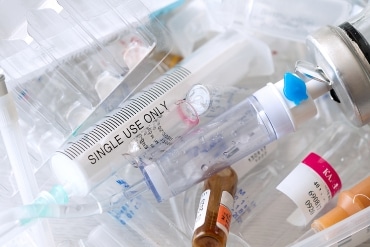All Points Medical Waste Blog
The Environmental Benefits of Onsite Medical Waste Treatment
Healthcare facilities across Florida generate substantial amounts of medical waste daily, from surgical centers to dental clinics. While proper disposal remains essential for safety and compliance, the environmental impact of traditional medical waste management deserves serious consideration. Onsite treatment technologies are revolutionizing how healthcare facilities approach waste disposal while significantly reducing their environmental footprint.
Traditional medical waste disposal typically involves multiple transportation steps, extensive packaging, and energy-intensive treatment at distant facilities. This process creates a substantial carbon footprint before waste even reaches its final destination.
Reducing Transportation Emissions
The most immediate environmental benefit of onsite medical waste treatment involves eliminating numerous transportation cycles. Traditional disposal methods require frequent pickups by specialized vehicles that travel hundreds of miles between healthcare facilities and centralized treatment plants.
Consider a typical medical facility in West Palm Beach that generates medical waste daily. Without onsite treatment, this waste travels to distant facilities, often requiring multiple trips per week. Each journey burns fossil fuels and releases greenhouse gases into Florida’s delicate ecosystem.
Onsite treatment systems process waste directly at the generation point, virtually eliminating transportation-related emissions. This reduction proves particularly significant for high-volume generators like hospitals and large clinics that would otherwise require daily pickup services.
Minimizing Packaging Waste
Traditional medical waste disposal relies heavily on single-use containers, bags, and packaging materials designed to maintain safety during transport. While these materials serve important safety functions, they contribute to overall waste volume and resource consumption.
Onsite treatment systems typically require:
- Fewer disposable containers since waste processes immediately
- Reduced packaging materials for transportation
- Less frequent container replacement cycles
- Simplified waste segregation requirements
This streamlined approach significantly reduces the volume of secondary waste materials entering Florida’s waste stream.
Energy Efficiency Advantages
Modern onsite treatment technologies operate with remarkable energy efficiency compared to large-scale centralized facilities. These systems treat smaller waste volumes more efficiently, avoiding the energy losses associated with large-scale operations and long-distance transportation.
Many onsite systems integrate with existing facility infrastructure to leverage existing utilities more efficiently than standalone treatment processes. This integration often results in lower overall energy consumption per pound of waste treated.
Supporting Local Environmental Goals
Florida’s unique environmental challenges make onsite medical waste treatment particularly valuable. The state’s extensive coastline, sensitive wetlands, and diverse ecosystems benefit from reduced vehicle emissions and decreased transportation activity.
Key environmental advantages for Florida include:
- Reduced traffic congestion on major highways connecting healthcare facilities
- Lower fuel consumption contributes to improved air quality
- Decreased wear on transportation infrastructure
- Reduced risk of transportation-related spills or accidents
Healthcare facilities implementing onsite treatment demonstrate environmental stewardship while maintaining the highest safety standards for biomedical waste management.
Water Conservation Benefits
Many onsite treatment systems require minimal water usage compared to traditional autoclave-based treatments at centralized facilities. Advanced technologies often incorporate water recycling systems or use alternative treatment methods that eliminate water consumption entirely.
This conservation proves especially valuable in Florida, where water resources face increasing pressure from population growth and climate change impacts.
The environmental benefits of onsite medical waste treatment extend far beyond simple convenience. These systems offer healthcare facilities an opportunity to reduce their environmental impact while maintaining compliance and safety standards.
Ready to explore eco-friendly medical waste solutions for your Florida healthcare facility? Contact All Points Medical Waste today to learn about sustainable disposal options that benefit both your operations and the environment.


